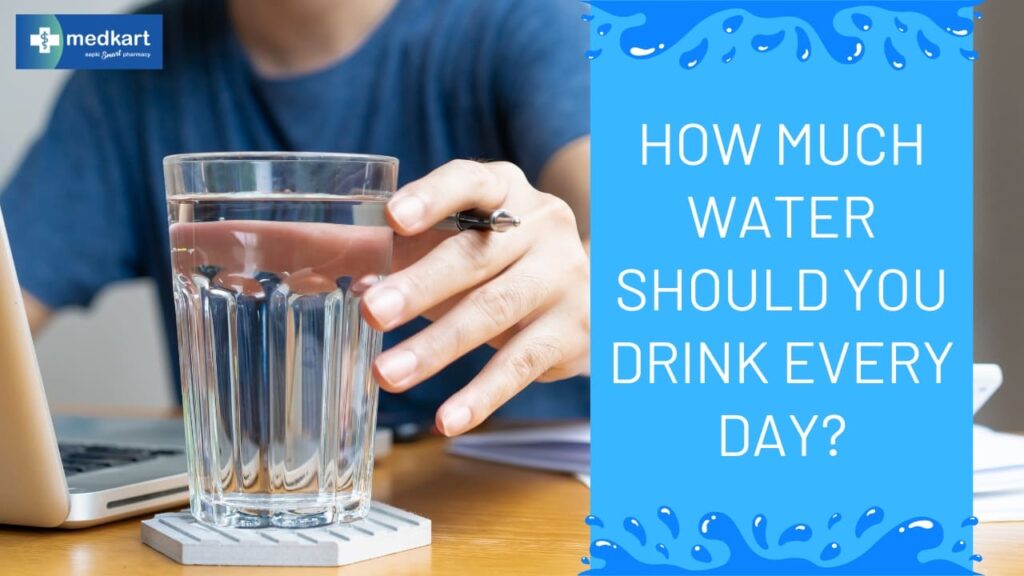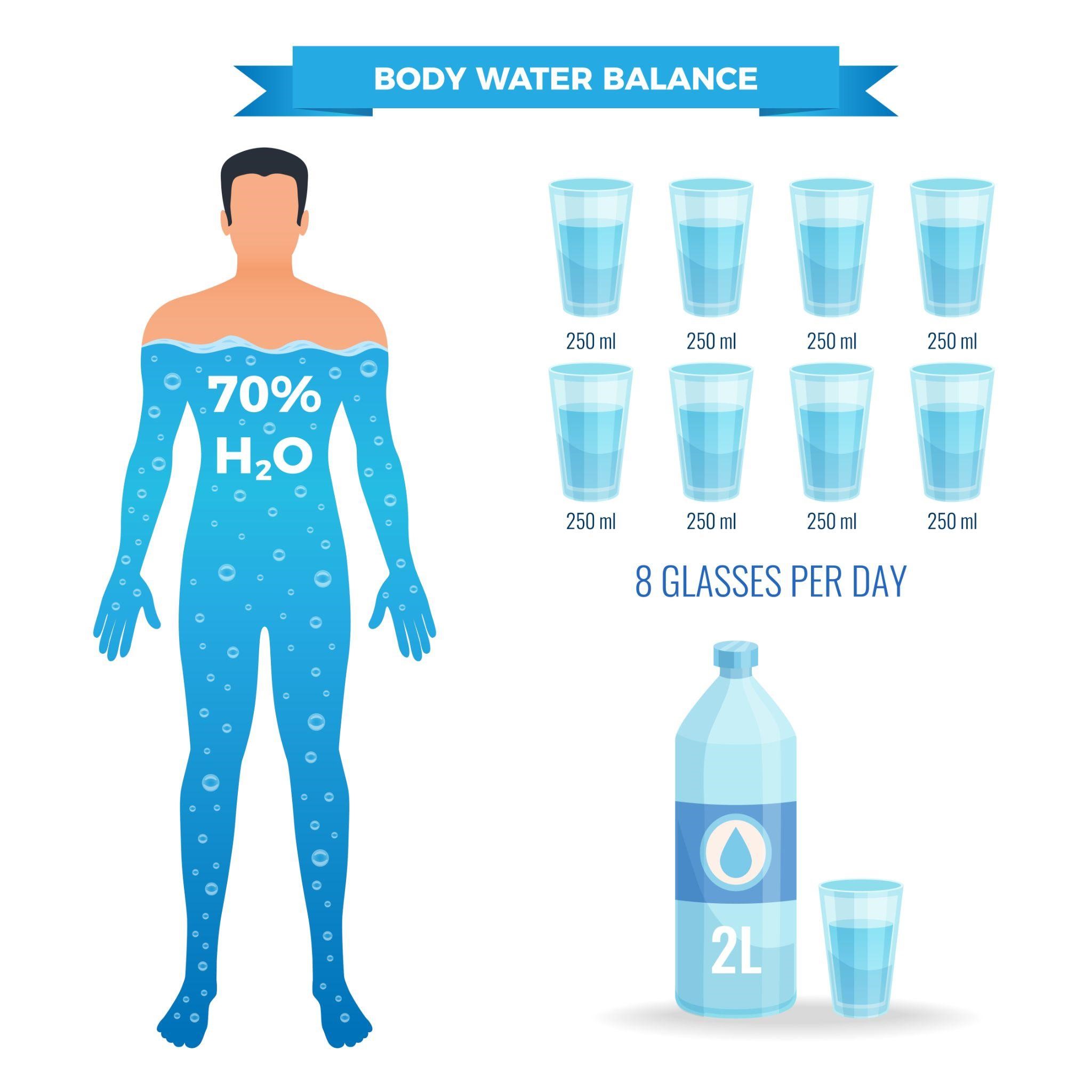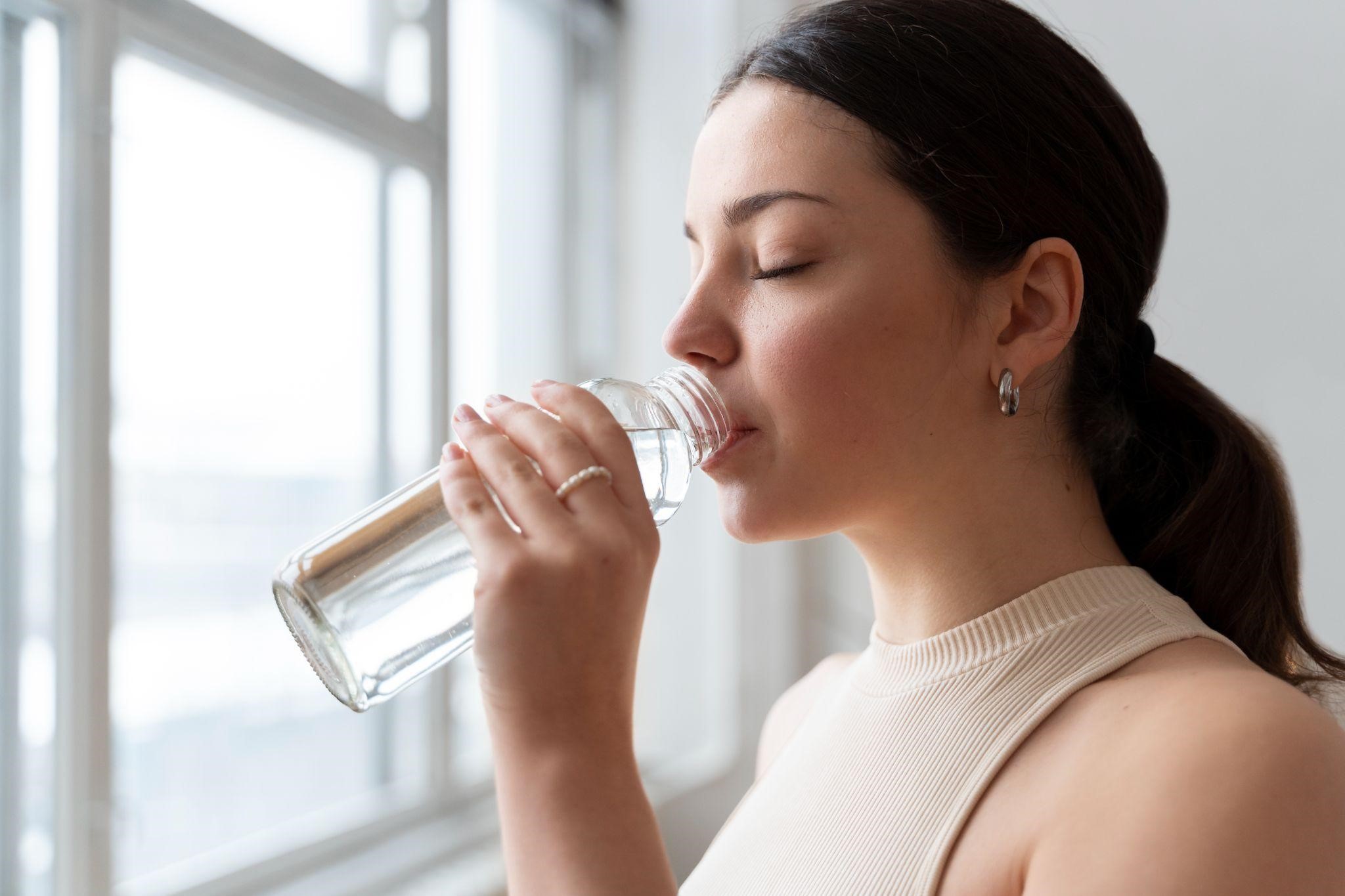Last updated on April 12th, 2025 at 04:12 pm
 While there isn’t a one-size-fits-all recommendation, a general guideline is to aim for around 8 glasses of water a day, which is roughly 64 ounces or about 2 litres. Determining how much water to drink per day is essential for maintaining proper hydration levels and supporting overall health. However, individual hydration needs can vary based on factors such as body weight, activity level, climate, and health conditions.
While there isn’t a one-size-fits-all recommendation, a general guideline is to aim for around 8 glasses of water a day, which is roughly 64 ounces or about 2 litres. Determining how much water to drink per day is essential for maintaining proper hydration levels and supporting overall health. However, individual hydration needs can vary based on factors such as body weight, activity level, climate, and health conditions.
Paying heed to your body’s signals for thirst is crucial, adapting your water consumption accordingly. Factors like physical activity, exposure to heat, or certain medical conditions may require you to consume more water to replenish fluids lost through sweat or other means.
Importance of Hydration – Quantity of Water Required for the Human Body
Water is the elixir of life, essential for our survival and well-being. We’re often reminded to drink enough water daily, but how much is “enough”? The answer isn’t one-size-fits-all; it depends on various factors such as age, weight, activity level, climate, and overall health. In this blog, we’ll delve into the science behind hydration and explore how much water you should aim to drink daily to maintain optimal health.
Water plays a crucial role in the functioning of virtually every physiological process within the human body. It helps regulate body temperature, aids in digestion, flushes out toxins, cushions joints, and keeps our skin supple and radiant. Without an adequate intake of water, our bodies can’t function optimally, leading to dehydration, fatigue, headaches, and other health issues.

Factors Affecting Daily Water Needs
- Body Weight: Generally, the larger you are, the more water you need. As a rule of thumb, experts suggest consuming around 0.5 to 1 ounce of water per pound of body weight. For example, a person weighing 150 pounds should aim for 75 to 150 ounces of water per day.
- Activity Level: Physical activity increases water loss through sweat, so those who exercise regularly or have active lifestyles need to replenish fluids more frequently. It’s recommended to drink extra water before, during, and after exercise to stay properly hydrated.
- Climate: Hot and humid weather can cause increased sweating, leading to higher fluid loss. In such conditions, it’s essential to drink more water to prevent dehydration. Similarly, individuals living at high altitudes may experience increased respiratory water loss and should adjust their fluid intake accordingly.
- Age: Children, elderly individuals, and pregnant or breastfeeding women have unique hydration needs. Infants and young children have higher water requirements relative to their body weight, while older adults may have reduced thirst perception, making it crucial for them to drink water regularly. Pregnant and breastfeeding women also require additional fluids to support fetal development and milk production.
- Health Conditions: Certain medical conditions such as diabetes, kidney disease, and gastrointestinal disorders can affect fluid balance and necessitate adjustments in water intake. It’s important for individuals with such conditions to consult their healthcare providers for personalized hydration recommendations.
Signs of Dehydration
It’s essential to recognize the signs of dehydration to prevent its adverse effects. Common symptoms include:
- Thirst
- Dry mouth and lips
- Dark-colored urine
- Fatigue
- Headache
- Dizziness
- Reduced urine output
- Confusion or irritability
- Sunken eyes
- Rapid heartbeat
Also Read:
- How to Remove Dark Circles?
- How to Lose Weight Fast?
- How To Reduce Belly Fat
- How Many Calories in an Apple?
Calculating your Daily Water Intake
While there isn’t a one-size-fits-all recommendation for daily water intake, you can use the following general guidelines to calculate your hydration needs:
- Convert your weight to pounds (if not already in pounds).
- Multiply your weight by 0.5 to 1 to determine the ounces of water you should aim to drink per day.
- Adjust your intake based on factors such as activity level, climate, and health conditions.

Tips for Increasing your daily Water Intake
- Keep a refillable water bottle handy all day long as a visual cue to stay hydrated.
- Set hourly hydration goals, aiming to consume a certain amount of water by specific times.
- Eat water-rich foods such as fruits and vegetables, which contribute to your overall fluid intake.
- Enhance your water’s taste by infusing it with refreshing lemon, crisp cucumber, or invigorating mint for a delightful drinking experience.
- Drink water before meals to help control appetite and aid digestion.
- Limit consumption of caffeinated and alcoholic beverages, as they can have diuretic effects.
- Monitor urine color; pale yellow or straw-colored urine indicates adequate hydration, while darker urine may signal dehydration.
> Consult a Doctor and Medkart will help you Order Medicines Online
Conclusion:
Proper hydration is fundamental for upholding optimal health and vitality. By understanding your body’s unique hydration needs and adopting healthy habits, you can ensure you’re getting enough water each day. Remember to listen to your body’s thirst cues, stay mindful of environmental factors, and prioritize hydration as an integral part of your daily routine. Cheers to a hydrated and healthier you!
Read: What are Generic Medicines?
FAQs on Water to Drink in a Day
Q1. How much Water should you drink every day?
The recommended daily intake of water varies depending on factors such as age, weight, activity level, and climate. As a general guideline, aiming for around 8 glasses of water a day, or approximately 64 ounces (about 2 liters), is often recommended. However, individual hydration needs may differ, so it’s essential to listen to your body’s thirst signals and adjust your water intake accordingly.
Q2. Does my water intake need to change based on my activity level?
Yes, your water intake should be adjusted based on your activity level. When you’re more active or engaging in exercise, you lose fluids through sweat, so it’s crucial to drink extra water to replenish what’s lost. It’s recommended to drink water before, during, and after physical activity to maintain proper hydration levels and support optimal performance.
Q3. Are there any specific health conditions that may require me to drink more water?
Certain health conditions, such as kidney stones, urinary tract infections, or gastrointestinal disorders, may necessitate increased water intake. Additionally, individuals with diabetes may need to monitor their water intake closely to help manage blood sugar levels. Pregnant or breastfeeding women also require additional fluids to support fetal development or milk production. It’s important to consult with a healthcare professional to determine if any specific health conditions warrant adjustments in your daily water intake.
Related Links:
- International Epilepsy Day
- World Cancer Day
- Maximum How Many Days to confirm Pregnancy?
- How to Increase Sperm Count?
- BP Normal Range for Female
- How to Remove Black Spots on Face?
- How to Prevent Hair Fall?
- Home Remedies for Loose Motion
- Diet Plan For Weight Loss
- How to Remove Tan from Face?
- How to Increase Breast Size?
- Normal Blood Sugar Levels Chart

